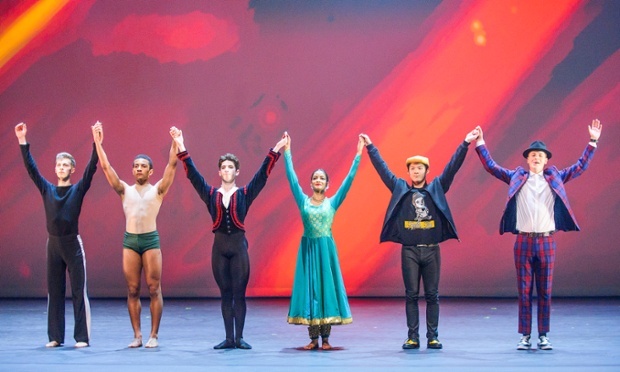I have more and more time for Simon Cowell. On Britain’s Got Talent on Saturday night he was dishing out his hard-faced reality check to the parade of wannabes who as usual range from silly asses through competent-karaoke to on-the-money in Sycospeak. I also admire the wily care for words with which he crafts his highest possible praise – ‘You’re probably quite honestly one of the best we’ve ever had on this competition.’ At least five legal outs there.
Meanwhile over on the BBC’s first Young Dancer competition live on BBC Two, ‘they were all winners’, every one of them, according to the beaming presenters. Just competing makes you a winner, yes, we know. Now, I don’t mind that on Masterchef when the contestants are amateurs. And the much maligned Beeb does a hell of a lot of well intentioned pro-artists stuff (eg Radio 3 Young Artist, the BBC Young Musician competition, and the now closing Performing Arts Fund, which launched Adele). But this dance compo falls smack in the middle of the current mania for proving TV’s transformative powers for supposedly unfairly hidden talents that the real world of employment has been too narrow-minded to notice.
To be sure, competitions are a major lever in professional dance progress. Carlos Acosta, Tamara Rojo, Michael Flatley, Diversity, Torvill and Dean, all had those life-changing moments when they beat others to the prize of a scholarship, a job, a world title. The Young Musician competition is of that ilk, since even at 18 musicians can be more or less platform-ready as soloists, and typical winners, such as pianist Freddy Kempf or violinist Nicola Benedetti, have seized the prize of a fast-track launch into an adult performing career. That’s the point: they’re technically capable of being artists.
By contrast, young dancers simply can’t be as technically advanced at 16 or 18 as musicians. Their bodies and professional skills have far to develop still, and even a prodigy would have virtually no career prospects as a teenage dance soloist. Fair enough, the BBC Young Dancer booty is modestly described as a ‘helping hand’, a grand or three to help with training costs, a great little support package, but no training contracts or employment promises.
Still, there’s a deep muddle there, in that there’s no level playing-field for ballet, contemporary, South Asian and street-dance. It isn’t possible that a half-trained classical ballet or kathak dancer would win a national contest – they wouldn’t even get through the application process.
Yet we had a lively self-taught hip-hop finalist, Kieran Lai, and the overall winner, the eager and expressively articulate ‘contemporary’ dancer Connor Scott, it turns out has only ever had part-time training and will now, at 17, finally start a full-time course at Rambert School. I agreed with the judges’ choice, given the field available. Connor is a diamond in the rough. It’ll probably take three or four more years to get that diamond out, though.
No star-is-born stuff here, then, the raison d’être of The Voice or The X Factor, just a lot of nice kids who would mostly be better advised to find better teachers than entering competitions. Which brings me to the elephant in the room. One of the BBC judges was originally scheduled to be Akram Khan, one of the three choreographers who last month upset the industry by complaining about the failings of British dance training. He would have been sitting alongside judge Tamara Rojo and ‘ambassador’ Carlos Acosta who’ve both recently opined that British children are being raised unacquainted with the work ethic required in dance.
Akram turned out to be busy (he’s preparing Sylvie Guillem’s farewell tour), but BBC Young Dancer would have made both livelier and more truthful arts TV if Zoë Ball and Darcey Bussell’s hearts-and-flowers cheerleading had been punctuated by dance’s Simon Cowell. The idea that, for instance, the ballet semi-finalists were the best in Britain is downright depressing. And Britain’s well promoted street-dance sector surely should be producing more incendiary soloists, given the competitive scene that feeds it.
By next time out the BBC Young Dancer has got to find its intellectual purpose as well as an edgier, more compelling watchability (it’s forecast to alternate biennially with Young Musician, which itself took a few years to settle down). Rethink the categories more broadly to admit jazz tap and any ethnic dance, rather than only hip-hop and kathak. And if you have real-life employers and real-life competition winners like Rojo, Acosta and Khan on the judges’ panel, get them to speak their mind for all to hear. The entrants would be terrified by the promise of candour, so standards would rocket. Then we actually would all be winners.






Comments